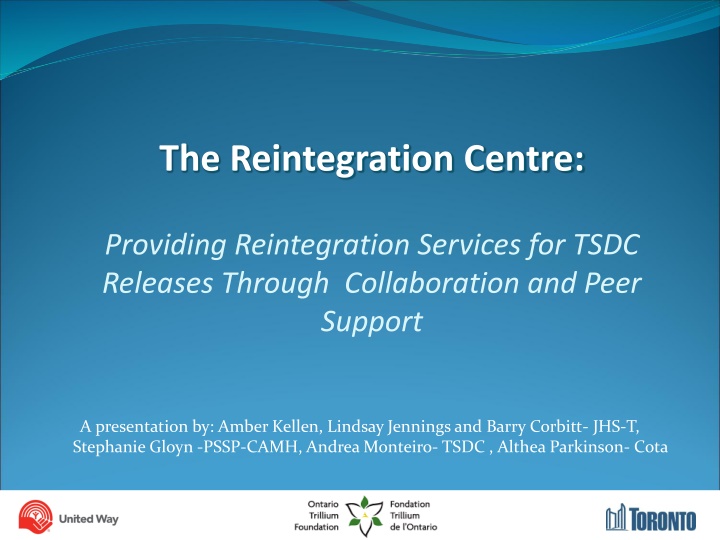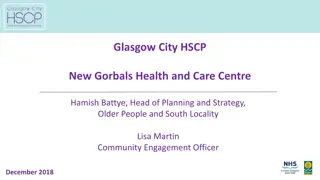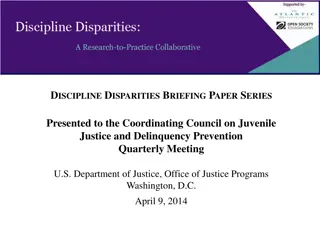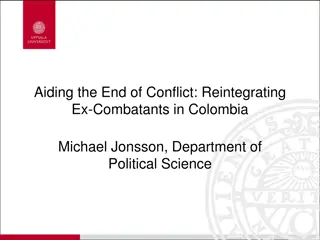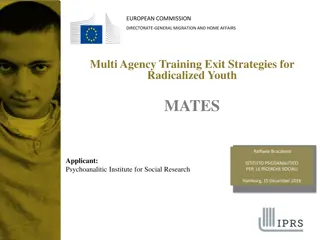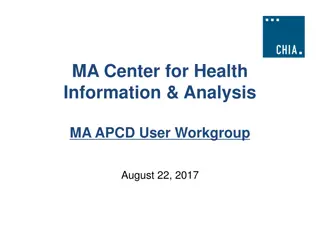The Reintegration Centre: Addressing Challenges in Reintegrating TSDC Releases
The presentation discusses the Toronto South Detention Centre's inmate population, challenges in serving remanded individuals, and the role of the Reintegration Centre in providing support and services for released men through collaboration and peer support. The TSDC, operational since 2014, houses mainly GTA inmates with diverse backgrounds. Despite facing obstacles, the Reintegration Centre focuses on offering reintegration services to support released individuals effectively.
Download Presentation

Please find below an Image/Link to download the presentation.
The content on the website is provided AS IS for your information and personal use only. It may not be sold, licensed, or shared on other websites without obtaining consent from the author.If you encounter any issues during the download, it is possible that the publisher has removed the file from their server.
You are allowed to download the files provided on this website for personal or commercial use, subject to the condition that they are used lawfully. All files are the property of their respective owners.
The content on the website is provided AS IS for your information and personal use only. It may not be sold, licensed, or shared on other websites without obtaining consent from the author.
E N D
Presentation Transcript
The Reintegration Centre: Providing Reintegration Services for TSDC Releases Through Collaboration and Peer Support A presentation by: Amber Kellen, Lindsay Jennings and Barry Corbitt- JHS-T, Stephanie Gloyn -PSSP-CAMH, Andrea Monteiro- TSDC , Althea Parkinson- Cota
By the end of today you will have Learned about the Toronto South Detention Centre and the unique challenges facing the inmate population 1. 2. Understand what the Reintegration Centre is, why it was developed and how it provides service to men leaving the justice system 3. Heard about the collaboration behind the Reintegration Center 4. Discovered the unique approach peers bring to the work and the value and its value
The Toronto South Detention Centre Became operational in January 2014. Replaced the Toronto Jail, Mimico Correctional Centre and Toronto West Detention Centre. When fully operational it will have the capacity to house: 1650 adult male remand inmates 320 intermittent offenders (weekend only) 5
Inmate Population & Statistics Average daily inmate population is approximately 890 Majority are from the GTA, and the inmate population presents with diversity that reflects the GTA Although the facility is not currently at full capacity, the TSDC has approximately 160 releases a week: 100 at Court 30 via TSDC 30 via TIC (Weekend Only) 6
Challenges in Serving a Remanded Population Majority of the inmates at TSDC are remanded awaiting court dispositions. Average length of stay for a remanded inmate is 34 days. Many remanded inmates spend very little time at the facility due to frequent court appearances, medical appointments etc. High volume of inmates with complex needs and high turnover of remanded inmates makes it difficult for staff and volunteers to engage with each inmate 7
Challenges continued. Some inmates are not interested in participating in rehabilitative services for fear that engagement will affect their court proceedings. Discharge planning and rehabilitation is extremely challenging 8
Overcoming the Challenges Despite the many challenges, the TSDC continues to build strong supports for its inmates through: Physical design of the TSDC Living Units which promote programming/services being delivered directly on the units Initial screening during admission to identify immediate needs An integrated clinical team Linkages with Community Partners/Stakeholders Engagement with various courts and police services Targeted spiritual, lifestyle and educational programs Clinical treatment programs targeted to meet the needs of a remanded population Community partnerships including the one with RC 9
TSDC & JHC RC Collaboration Referral Process to the RC Inmates are referred to the RC through TSDC Social Workers and the TSDC Volunteer Services Coordinators. These referrals are done both formally through inmate requests and liaison with the RC, and informally through word of mouth. TSDC and JHS-T are working together to begin offering Get Started information sessions for inmates on the TSDC living units in order to enhance the promotion of the services offered at the RC. 10
In addition. RC and the TSDC have been working collaboratively to assist inmates in meeting their personalized discharge planning needs. TSDC is an active member of the JHS RC Advisory Council TSDC participated in the JHS 2015 AGM The RC is promoted throughout the facility by TSDC staff TSDC staff often participate in RC events and meetings TSDC offers a number of inmate programs/services delivered by JHS and RC partner agencies 11
Visual Reminders of the JHS RC Posters on all occupied living units & in the TSDC discharge area Inmates are encouraged to attend the RC if they are in need of clothing, housing, legal support issues, and/or case management post discharge. Signage outside the TSDC discharge area directs inmates to the JHS RC. 12
Who We Are and What We Do Making our community safer by supporting the rehabilitation and re-integration of those who have been in conflict with the law. The John Howard Society of Toronto is a non-profit organization committed to providing and developing programs that reduce the social, economic and personal cost of crime
Post-Release Strategies and Services Housing- FTF, PIHS, TDTC Addictions/Relapse Prevention Intake and Case Management Pre-Employment Record Suspension (Pardons) Anger Management Etobicoke Reintegration Centre
Issues Facing Releasees Mental health Addictions Poverty Social isolation Barriers to employment Stigma Transportation HOMELESSNESS
The RC Dream was Conceived Goals: Acquire temporary space to provide integral services and interventions. Support and assist former inmates as immediately upon their release as possible in order to help them move back to their home communities and guide them toward reintegration support services and programs across the City of Toronto. Reduce the likelihood of re-offending, thereby increasing community safety and associated costs. Reduce the incidents of accidental deaths caused by drug overdose following release.
The RC Provide a HUB-like venue for men leaving the Toronto South Detention Centre to access support and referral services (enhanced service continuity from contact made prior to release). Immediate triage, assessment, and warm referrals from a team of committed professionals to: Homeless shelters, Housing help, Addiction detox and treatment, Legal assistance, Mental health assessment and referrals Other support services and programs, city-wide
The Reintegration Centre Partners and Key Stakeholders Cota African Canadian Legal Clinic/LAO Margaret s F.E.A.T. TSDC Toronto Justice Collaborative 22 Division PARC Members of our Advisory Committee/Evaluation Committee Funders: City of Toronto, OTF
Cota Inspiring Change- Release Planning Case Management Program Designed for inmates with a mental illness about to be released from TSDC While at the TSDC inmates are referred by the TSDC social workers to one of Cota s three Community Release Planners
Inmates work collaboratively with Release Planner to develop comprehensive community release plans Release planner supports inmates with prioritizing/identifying community resources needed to: Cope with various challenges Safely re-integrate into the community Experience an overall improvement in their quality of life Once inmates are released from TSDC, a Release plannercoordinates short-term intensive weekly meeting(s) to facilitate processes/support individuals to connect with community resources as identified in the release plans
Toronto Justice Service Collaborative Part of the System Improvement through Service Collaborative (SISC) Located at Provincial Systems Support Program at CAMH Purpose of SISC is to support local systems to improve coordination of and enhance access to mental health and addiction services. 21
Toronto Justice Service Collaborative Goal: Improve links to community based services & support for men & women leaving the Justice System Activities: 1.Support the Reintegration Centre service delivery & evaluation 2.Develop & Disseminate Toronto Justice Service Collaborative Housing Position Paper 3.Develop a Justice Walk-in Service at Fred Victors 24 hour drop-in centre
TJSC at the Reintegration Centre Service Pathway Supporting the evaluation On site coaching Tools & Products Trainings
Supporting Service Delivery at the Reintegration Centre On site coaching: Weekly on-site observations including meetings with intake staff and clients In-person and electronic correspondence with RC Coordinator and Manager
Supporting Service Delivery at the Reintegration Centre Tools & Products: Intake tool Reintegration center manual / guide for staff and partners Motivational Interviewing tips/techniques checklist Considerations to support safe and effective escorts and collaboration with RC partner organizations
Supporting Service Delivery at the Reintegration Centre Training: CPI Crisis Prevention First Aid CPR One Day Training Reintegration Centre Orientation & Training Motivational Interviewing Working with Trauma Mental Health 101 Justice System 101 Anti-racism, Anti-oppression
Peer Support Program The value of including people with lived experience in service delivery Traditionally used in a recovery model context (mental health, 12 step, in-prison) Importance of offering this approach with former inmate population Accompaniment and support Harm reduction educational and overdose prevention
Personal stories of re-entry after incarceration and of peer support work at the Reintegration Centre
Thank-you! Questions and Answers
John Howard Society of Toronto Amber Kellen Director of Community Initiatives, Policy and Research akellen@johnhowardtor.on.ca Barry Corbitt Peer Support Worker bcorbitt@johnhowardtor.on.ca Lindsay Jennings Peer Support Worker ljennings@johnhowardtor.on.ca
Toronto South Detention Centre Andrea Monteiro Deputy Superintendent, Treatment & Programs 416-354-4030 ext. 1040 andrea.monteiro@ontario.ca 31
Cota Althea Parkinson Release Case Manager p) 416-789-8797 parkinson_a@cotainspires.ca
Toronto Justice Collaborative- PSSP Stephanie Gloyn Project Lead for the Toronto Justice Service Collaborative 416-535-8501 ext. 36083 Stephanie.Gloyn@camh.ca
